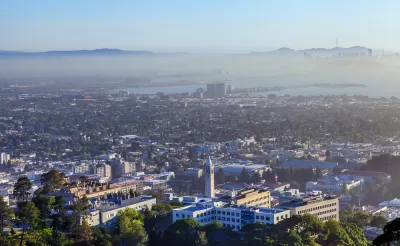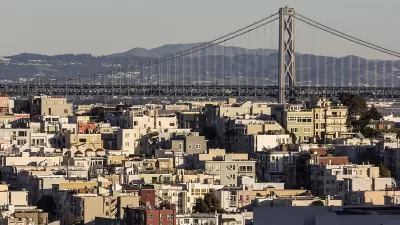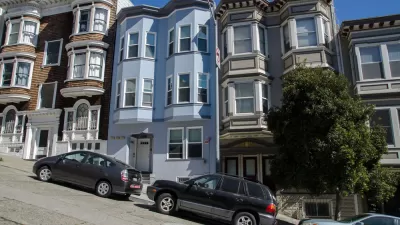One person’s return to the San Francisco Bay Area meant facing the dystopian realities of the rental market.

Living in the San Francisco Bay Area is not cheap or easy, says Wes Enzinna, in a first-person account of his own housing struggles and the drastic changes that had ensued in the 10 years since he had lived there last. He could not even find housing when he moved back to Oakland for a full-time job as an editor. He finally lands a shack, an unfinished tiny-house experiment in someone’s backyard:
There was no plumbing or running water to wash my hands or brush my teeth before sleep. Electricity came from an extension cord that snaked through a yard of coyote mint and monkey flower and up into a hole I’d drilled in my floorboards. The structure was smaller than a cell at San Quentin—a tiny house or a huge coffin, depending on how you looked at it—four by eight and ten feet tall, so cramped it fit little but a mattress, my suit jackets and ties, a space heater, some novels, and the mason jar I peed in.
He was living in West Oakland, an area with seedy motels, liquor stores, and rundown houses, but where homes were still selling for over $1 million to the continuing stream of high-income tech workers. He describes an extreme contrast of wealth and poverty, privilege and hopelessness: residents driving their Teslas from their fortified residential compounds and others hunkering down nearby in tent cities under the freeway.
Enzinna explores the issue of the widespread lack of affordable housing in the Bay Area and in much of California through his own experience—he later moves to a studio in San Francisco’s Telegraph Hill neighborhood—as well as that of people in his life. He was living in Oakland when a fire at the Ghost Ship, an artist collective, killed 36 people, and the aftermath of that tragedy put housing even more out of reach for the area’s most vulnerable residents:
In the year following the Ghost Ship fire, the nonprofit Safer D.I.Y. Spaces estimated that the city’s investigations of similar buildings led to the eviction of about eighty people—that many more added to the swelling population of homeless and displaced. Meanwhile, Oakland mayor Libby Schaaf exploited the tragedy by supporting laws streamlining the development process of condo projects, cynically claiming that they were a solution to the crisis exemplified by Ghost Ship because they created more housing—never mind that these condos were far out of reach of the bohemians who lived in places like Ghost Ship, much less the even more desperate folks, the truly impoverished, on the streets and in the tent cities.
Enzinna eventually heads back to New York, unable to keep up with the rent and increasingly unwilling to tolerate the façade that maintained a world of haves and have-nots in San Francisco. "In my case, I was finally forced back to reality by my credit-card debt: in less than six months in North Beach, I racked up $12,000 in charges trying to cover my bills and rent. The people of San Francisco weren’t happy. They were insane."
FULL STORY: Gimme Shelter

Maui's Vacation Rental Debate Turns Ugly
Verbal attacks, misinformation campaigns and fistfights plague a high-stakes debate to convert thousands of vacation rentals into long-term housing.

Planetizen Federal Action Tracker
A weekly monitor of how Trump’s orders and actions are impacting planners and planning in America.

In Urban Planning, AI Prompting Could be the New Design Thinking
Creativity has long been key to great urban design. What if we see AI as our new creative partner?

San Francisco Mayor Backtracks on Homelessness Goal
Mayor Dan Lurie ran on a promise to build 1,500 additional shelter beds in the city, complete with supportive services. Now, his office says they are “shifting strategy” to focus on prevention and mental health treatment.

How Trump's HUD Budget Proposal Would Harm Homelessness Response
Experts say the change to the HUD budget would make it more difficult to identify people who are homeless and connect them with services, and to prevent homelessness.

The Vast Potential of the Right-of-Way
One writer argues that the space between two building faces is the most important element of the built environment.
Urban Design for Planners 1: Software Tools
This six-course series explores essential urban design concepts using open source software and equips planners with the tools they need to participate fully in the urban design process.
Planning for Universal Design
Learn the tools for implementing Universal Design in planning regulations.
Gallatin County Department of Planning & Community Development
Heyer Gruel & Associates PA
JM Goldson LLC
Mpact (founded as Rail~Volution)
City of Camden Redevelopment Agency
City of Astoria
Jefferson Parish Government
Camden Redevelopment Agency
City of Claremont




























